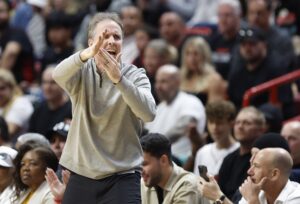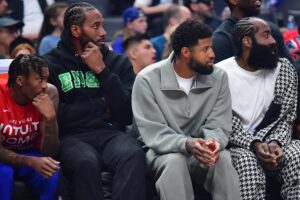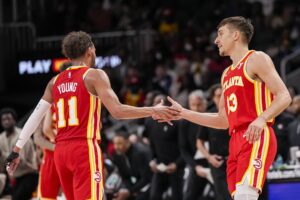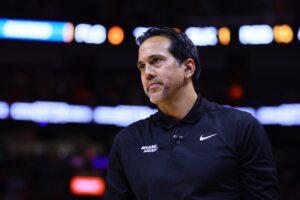When the Phoenix Suns declined to offer Deandre Ayton a max contract last summer, heads turned. The Suns were fresh off of an NBA Finals appearance. Surely, they’d do whatever was necessary to preserve the core that got them there?
Not so fast. Ayton has been a strong contributor for the Suns since they selected him first overall in the 2018-19 draft. However, in a league trending away from conventional big men, it’s arguably a misallocation of resources to reserve a max slot for one in your salary table. It begs the question: why did the Suns select one with the first overall pick?
Is Deandre Ayton Worth a Max Contract?
The Suns created this dilemma, and now they’ll have to resolve it. Granting Ayton a max simply because they selected him first would be to accept a sunk cost fallacy. They need to look at other centers making max money and ask themselves if Ayton is on track to produce on their level. Here, we’ll compare his production in his fourth season to the only centers making 30 million dollars or more per season in theirs. Here’s how Ayton compares to Rudy Gobert, Karl Anthony-Towns, Nikola Jokic, and Joel Embiid in their fourth NBA seasons.
Deandre Ayton vs Rudy Gobert
Ayton is a solid, reliable defender, but can he compare with a 3x Defensive Player of the Year?
In terms of basic counting stats, Ayton is arguably further along than Gobert was at the same stage of his career. His averages of 17.0 points, 11.0 rebounds, and 0.8 blocks per game compare favorably with Gobert’s 14.0, 12.8, and 2.8 in 2016-17. Having said that, the discrepancy in blocks per game does point to the reason Gobert ultimately earned a 35 million dollar a year salary.
The advanced metrics paint a clearer picture of how that happened. Ayton enjoys a narrow advantage in Offensive Box Plus/Minus (OBPM) at 2.4 vs 2.2, but unsurprisingly, 2016-17 Gobert trounces him in Defensive Box Plus/Minus (DBPM). He posted a 2.2 in that category in his fourth year, where Ayton is currently at 1.0 in 2021-22. Overall, Gobert’s general BPM of 4.4 is significantly higher than Ayton’s 3.4 mark.
Ayton may be ahead of Gobert’s developmental curve offensively, but he’s got tremendous work to do to approach the Stifle Tower’s level of defensive proficiency. Furthermore, it’s arguable that Ayton is the benefactor of a stronger point guard than Gobert has ever played with. If 2016-17 Gobert had been able to dance with Chris Paul in the pick-and-roll, he may have averaged a few more points per game as well.
It would be difficult to make the case that Ayton is on track to meet Gobert’s production throughout his next contract.
Deandre Ayton vs Karl-Anthony Towns
If Ayton has work to do to catch Gobert on defense, it’s on the opposite end where he’ll struggle to meet KAT’s production. Comparing basic counting stats between Ayton and Towns in their fourth seasons does not bode well for Ayton’s max contract aspirations.
By Towns’ fourth season, his superstardom was apparent. He averaged 24.4 points, 12.4 rebounds, and 1.6 blocks per game. Of course, blocks per game are not a direct proxy for defensive ability, and Towns has been known to struggle on that end. Still, his fourth-year DBPM of 0.6 only lags slightly behind Ayton’s 1.0. Meanwhile, his OBPM (5.4) and overall BPM (6.0) tower over Ayton’s marks.
Towns is one of the most gifted offensive big men in league history. It should come as no surprise that he’s a max contract player. It should be equally unsurprising that Ayton has considerable work to do to reach his level.
Deandre Ayton vs Nikola Jokic
One may argue that it’s not fair to compare Ayton to the league’s most recent MVP. On the other hand, Ayton is a recent first overall pick who is vying for a max contract. It may be a precisely fair comparison.
Jokic hadn’t yet reached his full form by his fourth year (2018-19) but he was still remarkable. His averages of 20.1 points, 10.8 rebounds, and 0.7 blocks per game don’t tell the whole story. Jokic’s best ability is his passing, and that was already apparent by 2018-19. He averaged 7.3 assists per game that season. Ayton doesn’t shoulder the same playmaking responsibility in Phoenix, but his 1.6 helpers per game don’t indicate that he has much potential in that area either.
Meanwhile, the advanced stats already pegged Jokic as an MVP-level player by 2018-19. He posted a 6.2 OBPM, 2.9 DBPM, and overall 9.1 BPM. It shouldn’t be controversial to say that Ayton is unlikely to reach Jokic’s level in the NBA. He’s widely regarded as the best center in the league.
Deandre Ayton vs Joel Embiid
If Jokic isn’t the best center in the league, it’s due to Embiid’s two-way dominance. He was already an apparent superstar by his fourth season in 2019-20, with averages of 23.0 points, 11.6 rebounds, and 1.3 blocks per game.
Once again, the advanced stats tell us that Ayton is lagging behind a handsomely paid peer. It’s interesting that Embiid’s DBPM was 1.0, the same as Ayton in 2021-22. These metrics are imperfect by nature. We know that Embiid is one of the best rim protectors in the NBA and that Ayton, while solid on that end, isn’t comparable. Meanwhile, Embiid’s OBPM (3.7) and overall BPM (4.7) were far ahead of Ayton’s at the same stage.
Ayton Not a Max Caliber Player
In comparing Ayton to the only four centers to make over 30 million dollars this season, at the same stage in their careers, it’s apparent that he’s not on track to meet their production. Ayton lacks a signature skill in comparison to each of these players. He can’t protect the rim like Gobert, shoot like Towns, pass like Jokic, or score on the low block like Embiid.
None of which is a major knock on Ayton. He’s a very useful rim-running, rim-protecting big man. It’s simply a fact that teams are not prone to commit so much of their salary space to such a player in 2022. If anything, Ayon compares favorably to the next tier of big men. Players like Clint Capela (18.6 million) and Jarrett Allen (20 million) probably more accurately reflect his value.
The Suns may be stuck. They already committed the number one pick to Ayton. Losing his production may vault this surging squad back into the lottery sooner than later with Chris Paul aging. If even one other team deems Ayton worthy of a max deal in restricted free agency, the Suns may be forced to match it.
That doesn’t mean it’s a good investment.
Main Photo
Embed from Getty Images






